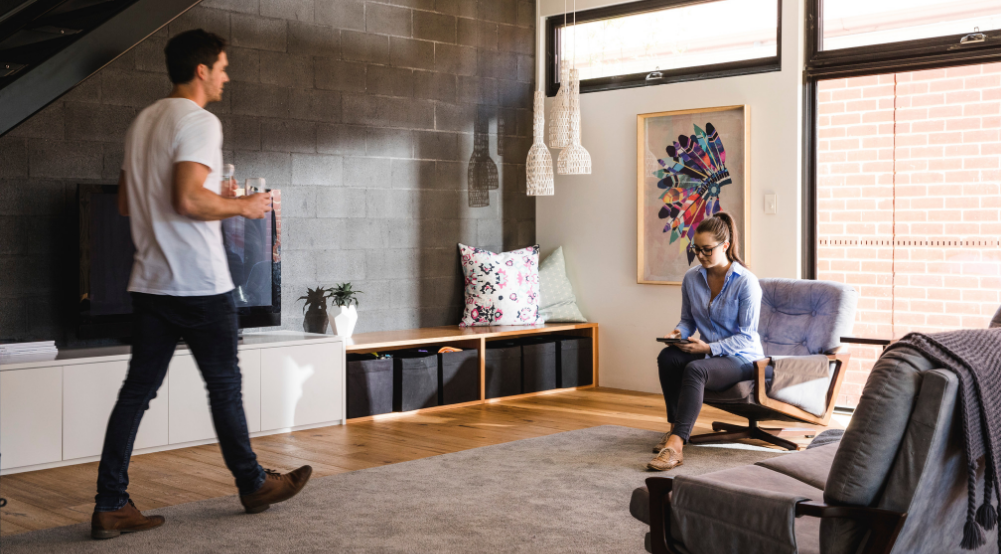When Amy Webster’s sister, Margie, found her dream home in Balgowlah, NSW, there was one problem. It was totally out of her price range.
“Then, we realised we could pool our resources and buy it together,” Webster says.
With housing affordability a national social and economic issue, should more siblings consider joining forces to get a slice of the property pie? Given they shared the same home in childhood, why not as adults?
Webster, a psychologist, said her experience (the sisters purchased the property in 2000) was really positive overall. “It’s not just a housemate; you have a deep relationship with them,” she says. “It gave me an opportunity to get a foot into the Sydney real estate market which I couldn’t have done by myself at that time.”
However, anyone going into a similar arrangement should think about the end, Webster advised. The sisters were both in their 20s when they first purchased the house.
“We did make an agreement when we bought it that we would commit to three years living there. As it turned out, we stayed there five years until I got married in 2005.
That was a little bit stressful,” she says. “She was quite keen for me to keep my stake in the house, and I was quite keen to sell. I had a lot of guilt. In the end, it worked out really well cause she bought me out.”
Another option for siblings is to buy an investment property together.
After Armand Aguillon was knocked back for a loan (in 2005), he joined forces with his older sister to realise his goal of purchasing a property by age 30.
Using their combined economic power, the Gold Coast-based siblings were able to get a loan for an investment in Cranbourne, Victoria. “We held onto it for 10 years and sold it in 2015,” Aguillon says. “We never stepped foot in it at all. We hired a real estate management company. All we had was pictures.”
The siblings made a profit on the sale which enabled Aguillon to invest in other property. “Everyone was pretty happy,” he says. “If you have a good relationship with your sibling and you know you can partner with that person, by all means, do it.”
Microsoft program manager Megan Mallin, 41, already owned her own home with her husband but decided to pair up with her sister to buy a weekender at Toowoon Bay on the Central Coast. Mallin was familiar with the area from childhood holidays. “We both couldn’t afford to do it on our own,” she says.
It’s a situation that’s worked out well for the whole family who enjoy regular weekends together at the house. Mallin credits the success of the venture to a good relationship with her sister and having a solid structure in place for the arrangement. “We have a joint bank account; we do everything 50/50 – we split the costs, rates, strata, everything like that.”
In a 2017 Westpac study, only 14 per cent of aspiring first-home buyers said they would consider purchasing a property with someone other than a spouse or parents.
David Dawson, founder of Kohab (a digital platform connecting those who want to co-own a property and the marketplace) thinks co-buying with the right person is a good solution to the issue of housing affordability. “It’s a major issue for young people buying property,” he says. “[Co-ownership] gives them an entree into ownership or a foot on the ladder. Why do you need to own an entire property? Most people buy a property and own that property with a bank anyway. Why not own that property with a sibling, friend or a parent, that gives benefit to both parties.”
Dawson says a co-ownership agreement is essential if you’re buying with someone other than a spouse. “A co-ownership agreement is a legally binding contract that allows them to split the title of the property and be able to obtain loans independently … to be assessed on their income and their ability to repay the debt individually.”
A traditional bank loan assesses you on your ability to pay the whole amount if the other person defaults, Dawson explains. He says siblings should also purchase as “tenants in common” rather than “joint tenants”. “If a ‘joint tenant’ passes away, the other person automatically gets that property,” he says. “You may not want that.”
“The most important thing is to buy with someone you know and trust, and get the right loan,” Dawson says. “Make sure you have the right legal agreement, understand the obligations and the exit opportunity.”
He recommends having a sunset clause. This provides an agreed timeframe in which both parties agree to keep the property, live in it, or rent it out.
“You’ve got to anticipate that in life things change, which is why it’s not for everyone.”
http://ow.ly/LWMK50roLsj
